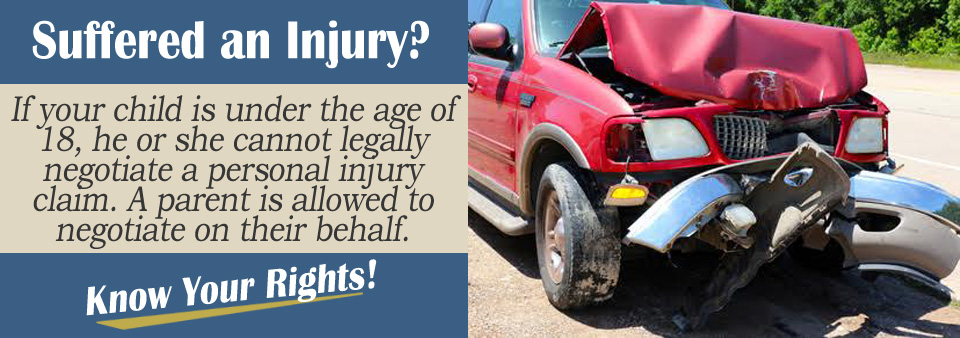It is every parent’s worst nightmare. Your child has been involved in a car accident and has been injured. As the parent, you are the one responsible for your child and will need to fight for him or her in recovery for injuries sustained. However, how do you go about pursuing a personal injury claim on behalf of your minor child?
We have asked attorney, Alaina Sullivan, about what you should do. Here is what she had to say:
Negotiating on Behalf of a Minor Child
Though every state is different, a child always as a right to compensation for injuries sustained in an accident, including pain and suffering or disability. On top of that, a parent has the right to be compensated for any medical bills or property damage he or she has paid on behalf of the his or her child.
However, until your child is the age of 18, he or she cannot legally negotiate a claim independently. For this reason, a parent is allowed to negotiate on behalf of his or her child. The parent must first request permission from the court to negotiate for the child. In most situations, this involves petitioning the court.
The process is fairly simple and straightforward. Your insurance company should be able to assist you in completely the documents needed to request court approval. If your insurance company is unwilling to work with you, which is unusual since their main interest is ensuring that the claim is properly completed, you should speak with a personal injury attorney.
Factors to Consider
A court will not give you a blank approval to proceed on behalf of your child. Some factors must be considered prior to approval. The judge will want to know your relationship to the child as well as what your involvement was with the accident that led to the injury.
Were you responsible for it, or were you a part of the accident? If you were, you may be barred from pursuing personal injury claims on behalf of your child. You must be “free” of the accident situation and have no responsibility for injuries caused because of it. Another person may have to step in on behalf of the child, or the court could appoint a “guardian ad litem” for the child to proceed.

Contents of Complaint
A parent can seek damages on behalf of his or her child including, but not limited to, past and future medical expenses, loss of future earning capacity, pain and suffering and emotional distress. Property damage will be pursued by the parent individually since legally a child is not allowed to own property until the age of majority.
Settling Outside of Court
Because a minor child is not old enough to sign onto a settlement, a court will need to approve any settlement the insurance company and you, as the parent, are able to agree upon. This is otherwise known as a minor’s compromise petition, which tells the court the terms of the settlement, describing how much money goes to pay each type of damage requested.
Many courts will request funds be kept for the benefit of the minor in a special, restricted account, to be released to the child when he or she turns 18.
Statute of Limitations
With any personal injury claim it is important you are aware of your state’s statute of limitations. All states have some set time limit allowed for individuals to pursue a personal injury claim. The majority of states set theirs at two years, though some are for longer periods.
In some states, the statute of limitations does not begin to run until the child turns 18. However, it is important you speak with an attorney to fully understand how your state handles personal injury cases, specifically involving minors.
Contact an Attorney Today
A licensed personal injury attorney will be able to evaluate your case and determine if you have a claim against the other party’s insurance company. To receive the compensation for your medical bills, property damages, and pain and suffering, you should speak with a personal injury attorney in your area today.